Keuka College
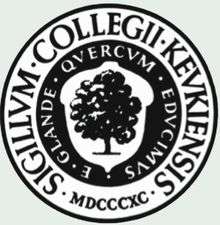 Seal of Keuka College | |
| Type | Private independent, liberal arts four-year, coeducational, institution with emphasis on career and pre-professional education |
|---|---|
| Established | 1890 |
| President | Jorge L. Díaz-Herrera, Ph.D. |
| Location |
Keuka Park, New York, United States 42°36′55″N 77°05′26″W / 42.61535°N 77.09053°WCoordinates: 42°36′55″N 77°05′26″W / 42.61535°N 77.09053°W |
| Campus | Rural, 288 acres (1.17 km2), including 1,050 feet (320 m) of shoreline and a 34-acre (14 ha) community athletic complex[1] |
| Colors | Green and Gold |
| Nickname | Wolves |
| Website |
www |
 | |
Keuka College is an independent, liberal arts-based, four-year, residential, coeducational college that emphasizes experiential learning as well as career and pre-professional education. Founded in 1890, the school is located in Keuka Park, on the shores of Keuka Lake in the U.S. state of New York's Finger Lakes region. The Carnegie Foundation for the Advancement of Teaching classifies Keuka College under the "Master's Colleges and Universities (small)" category, noting its curricular engagement and outreach and partnerships.[2] Keuka is accredited by the Middle States Commission on Higher Education.[3] The school offers both bachelor's and master's degrees on its home campus.
In addition, its Accelerated Studies for Adults Program (ASAP) offers degree completion at more than 20 sites throughout Upstate New York, as well as through online courses. The traditional student-faculty ratio is 14:1. The ratio of women to men is 3:1. Total enrollment of the college is 1,873. There are 921 ASAP, 1,546 full-time and 327 part-time students. Keuka College aims to provide an affordable, private liberal arts, sciences, and career education. As a result, over 93% of the full-time undergraduates at Keuka receive some form of need-based financial support, with the College awarding over 11 million dollars in aid each year.[4][5]
Since the early 2000s, Keuka has also become a major educational provider in the Pacific Rim, with more than 3,000 students pursuing Keuka degrees at partner universities in China and Vietnam.[6][7]
The school is situated on picturesque Keuka Lake, picked by the Weather Channel as one of the best lakeside retreats.[8] Keuka College students, faculty and staff enjoy more than a thousand feet of shoreline, including Point Neamo, a private beach with a boat house and equipment for checkout. For additional recreational and artistic pursuits, Keuka students have access to the 34-acre Jephson Community Athletic Complex, the indoor sports facilities at the Weed Physical Arts Center, and the Aben and Lightner Art Galleries inside the Lightner Library.
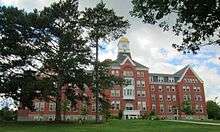
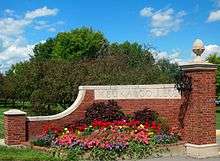
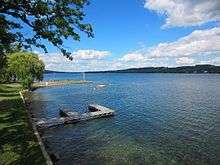
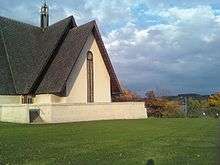
Academics
Keuka College offers 31 bachelor’s degree programs on its home campus, many with specialized concentrations; there are also 27 minors and self-designed majors. In addition, Keuka offers seven master's degree programs and pre-professional programs in dentistry, law, medicine, veterinary medicine, optometry, pharmacy, and occupational therapy. Some of the key academic offices and research and learning centers at Keuka include: the Office of the Vice President for Academic Affairs; Academic Success at Keuka (ASK); Accelerated Studies for Adults (ASAP); the Center for Aquatic Research; the Center for Experiential Learning; the Center for Global Education; and the Lightner Library.
Keuka places emphasis on experiential education. At the heart of Keuka’s commitment to experiential learning is Field Period, a required internship program for Keuka's home campus undergraduate students. Each year, they garner 140 hours of hands-on experience, putting into practice what they learned in the classroom. Students may elect to pursue international Field Periods with the College’s partner universities or on their own. Community service has been part and parcel of the Keuka experience since it was founded and today, all of the 40-plus clubs on the home campus are required to conduct at least one community service project each semester.
The Field Period, or student-designed internship every year while enrolled, makes this institution a national leader in hands-on learning, as has been noted by the New York Times.[9] In addition to meeting the needs of traditional students, Keuka's Accelerated Studies for Adults Program (ASAP) offers bachelor's degree completion and master's degree programs at locales around the state.
Regardless of degree or location, Keuka graduates gain significant, real-world working and learning experience throughout their stay at Keuka that make them attractive to employers and graduate schools. Experiential learning has long been the cornerstone of the Keuka experience, going back to at least 1942. A number of respected, national sources have praised the Keuka experience, including the print media (U.S. News & World Report, The New York Times, Washington Monthly), educational foundations (Carnegie Foundation for the Advancement of Teaching), and even the White House (President’s Higher Education Community Service Honor Roll).
Through its Accelerated Studies for Adults Program (ASAP), the College offers bachelor's degree completion programs in organizational management, criminal justice systems, social work, and nursing, as well as master's degrees in management, criminal justice administration, and nursing at locations around New York state. The College also extends educational opportunities via the Internet through its Wertman Office of Distance Education.
Keuka has an international presence, particularly in the Asia-Pacific region, with around 2,680 Chinese students pursuing Keuka degrees at four partner universities, one of the largest enrollments of any U.S. college operating in the country. The Keuka-China international educational partnership has the approval of the Office of Academic Degrees Committee for the State Council in China. Another 505 Vietnamese students are doing likewise at two partner universities in Vietnam. More than 110 international students from different countries study on the home campus.[10][11]
Academic offices & centers
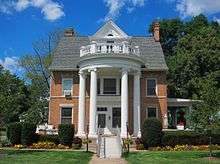
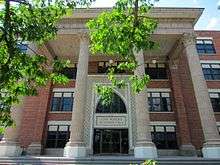
- Academic Affairs[12]—The Office of the Vice President for Academic Affairs provides leadership for all academic programs in support of the College mission and ensures academic excellence. The academic affairs office also has responsibility for those academic units that support student success: the Registrar, the Lightner Library, the Center for Experiential Learning, Educational Technology, institutional research, and the Academic Success at Keuka (ASK) Program. Other responsibilities of the office include the development, review, and implementation of academic policies and procedures; assessment; budgeting for academic programs; and faculty personnel actions, including re-appointment, promotion, and tenure.
- Academic Success at Keuka (ASK)[13]—In addition to providing services to students with disabilities, ASK is also available to help all students enhance study skills, improve time management, and earn better grades through peer and professional tutoring in writing and other subjects.
- Accelerated Studies for Adults Program (ASAP)[14]—Individual degree programs are designed to meet the needs of busy, active adults—classes are offered at more than 20 hospitals and community colleges throughout New York state. More below.
- Center for Aquatic Research (CAR)[15]—The Center capitalizes on Keuka College's excellent location on the shore of Keuka Lake and engages in research, teaching, and outreach. Research has been conducted on the ecological impacts from deep chlorophyll layers (DCL) in Keuka Lake. CAR researchers have worked with researchers from Cornell University, Hobart and William Smith Colleges, and Finger Lakes Community College and other institutions on a state-funded project that investigates water quality issues on Owasco Lake. CAR researchers have also presented their findings at regional and national scientific conferences. In addition, the Center hosts summer workshops for area high school science teachers as well as people interested in the aquatic ecology of Keuka Lake and of the larger Finger Lakes region. CAR has had an international aquatic research partnership with Wenzhou University on the east coast of China.[16]
- Center for Experiential Learning[17]—The Center for Experiential Learning serves as a bridge, connecting internships, the classroom and co-curricular activities, into a mutually reinforcing learning network. Interns have worked in local and out-of-state hospitals, schools, day care centers, set up Web sites for nonprofit groups, connecting lessons in video art with the digital nuts and bolts of the workplace; accounting majors have helped with auditing at major companies, including KPMG, one of the "Big Four" auditors in the world.[18][19] Experiential Learning is the central focus of the student experience, which gives students the Keuka advantage, namely, real-world experience for the 21st century, enabling them to build up ties, skill sets, and experiences even before they graduate and enter the world force or graduate or professional programs. Experiential learning at Keuka occurs in the classroom, co-curricular activities, the workplace, and the community. It is integrated and weaves throughout the four years, and begins day one. One of Keuka College's stated goals is to produce graduates who are lifelong learners, able to apply their learning and skills in a continually-changing world for personal and career satisfaction, and for a better community.
- Center for Global Education[20]—The Center serves Keuka students on the Keuka Lake home campus who look for opportunities to study abroad, or for information about the College’s many international ties. It also serves international students looking to study at Keuka College in the United States, and Keuka China or Keuka Vietnam students interested in Keuka College's exchange programs.
- Lightner Library and the Aben and Lightner Art Galleries[21][22]—The Lightner Library houses books, journals, computer labs, and electronic resources. It is also home to two art galleries. The Robert S. & Rebecca Bannan Aben Gallery features the work of world-renowned artist Yankel Ginzburg. The Ginzburg art was donated to the College by the Aben Family. The Lightner Art Gallery has showcased the works of local and regional artists, as well as those of Keuka students, on a rotating, monthly basis for the past 25 years.
- Office of the Registrar[23]
Adult education
The Keuka College Accelerated Studies for Adults Program (ASAP) offers degree completion and master’s programs for working students. Classes are held one evening a week at community college and hospital locations throughout Upstate New York, including Syracuse, Auburn, Corning, Rochester, and other locations.[24] Bachelor’s degrees can be earned in management, criminal justice, nursing for RNs, and social work. Master’s degrees are available in criminal justice administration, management, and nursing.[25]
History
Overview
Keuka College was founded in 1890 by George Harvey Ball (1819-1907), who envisioned a college that would provide a high-level education to all deserving students, regardless of economic background. As a brochure produced in 1891 attested: Keuka College was “pre-eminently, for the common people…With ample endowment,” the brochure continued, “it will raise an army of...superior men and women who shall bring strength to the nation and help to humanity.”[26][27]
The first academic building was dedicated on August 14, 1890. In an article published the next day, The New York Times noted that the hall was built on "one of the most beautiful locations on the Keuka Lake," and that it was "a firm-looking building, four stories in height, of brick and stone." The freshman class in Fall 1890 consisted of eighty students.[28]
The College faced financial troubles and decided to suspend active instruction in 1915. In 1919, Arthur H. Norton (after whom the Norton Chapel is named) was chosen as the president of Keuka and worked to revitalize the College. Under Norton, who would serve as president for the next 16 years, Keuka resumed instruction in 1921 as Keuka College for Women. During this trying time (1919-1921), Norton personally wrote more than 3,000 letters, published and mailed at least 10,000 pamphlets, made 66 speeches, and surveyed 76 colleges in order to advance Keuka's cause. Dr. Gertrude Martin, former dean of women at Cornell University, became a Keuka trustee and advised the now women's college[29] The Ball Brothers—founders of what would become the Ball Corporation, a S&P 500 company, and benefactors of Ball State University—were among the key supporters of Keuka at this time. Years earlier, with their father in poor health, the young Ball brothers "found a friend and confidant in their uncle," George Harvey Ball. When the Ball brothers' mother, Lucius Styles Ball, died, Uncle George provided financial support and some measure of stability to the young Ball brothers. George Harvey Ball also provided his nephews with funds that helped launch their successful enterprise.[30][31] The Ball brothers expressed their gratitude to their uncle by supporting Keuka College, donating land and providing funds. In recognition of this, the first academic building was renamed Ball Hall (Ball Memorial Hall) in 1921 after founder and first president George Harvey Ball and the Ball Brothers[32] The Ball Family also supported Hillsdale College in Michigan.[33]
In 1924, Hegeman Hall and Richardson Hall (later renamed Harrington Hall) were built. Both of these buildings remain key buildings on campus today, flanking Ball Hall. During World War II, Keuka expanded its nursing program in order to provide professionally trained nurses to the war effort. Then, as now, Keuka's emphasis on experiential learning meant that it had a nursing program combining "academic study in the classroom and clinical work at the hospital."[34] Keuka remained a single-sex institution until 1985, when declining enrollment at that time (from 536 total students in 1979 to 407 students in 1984) caused the Board of Trustees to vote in favor of admitting men. Since then, enrollment has increased to close to 2,000 students as of 2012. In the late 2000s, thanks to generous donations from alumni and friends of Keuka, Ball Hall was restored for the benefit of future generations of Keuka students. The preservation and renovation of the historical centerpiece of Keuka College received a citation award in 2008 from the American Institute for Architects-Central New York (AIACNY).[35]
After nearly 125 years, the mission of Keuka College remains much as it was in 1890: to create exemplary citizens and leaders to serve the nation and the world of the 21st century.[36] Keuka College is in the process of implementing its long range strategic plan, which has four overarching goals: (1) fostering highly engaged students, employees, and alumni, (2) delivering innovative and excellent academics, (3) providing a 21st-century global learning environment, and (4) achieving financial sustainability within a mission-driven culture. Eighteen specific strategic initiatives have been outlined in support of the four main goals. These initiatives include plans to boost student and alumni engagement; to redesign the core curriculum, emphasizing citizenship, leadership, and experiential learning; to enhance digital infrastructure and enrich physical facilities; to improve recruitment and retention of students; and to support faculty and staff through a reconfiguration of workload, compensation, diversity, and professional development.[37]

Field Period
In 1942, Edith Estey, a 1933 Keuka graduate and administrator, created the Field Period program, which continues to be a major component of a Keuka College education as administered through the Center for Experiential Learning. During a Field Period, each Keuka student is required to spend 140 hours per year (or approximately one month) in a self-directed learning experience. This can involve a work internship, a community service project, spiritual exploration, personal development, cross-cultural diversity exploration, or a group cultural experience to another city or country.
The student is graded on a pass and fail basis with the potential to earn three credits. The Field Period can be completed over summer break or winter break, as students have the month of January off. Students design a learning contract with the site of their choice that outlines learning goals and objectives that must be met. Each student's site supervisor evaluates the student's work ethic and progress and reports back to Keuka College's Experiential Learning office. Upon completion, students meet with their academic advisors to present unique documentation of the experience and hand in a recap paper and reflective journal.
In his book, Cool Colleges: For the Hyper-Intelligent, Self-Directed, Late Blooming, and Just Plain Different, author Donald Asher observes that Keuka College "does a fantastic job of tying classroom experience to the real world" and "has a holistic approach to make an intentional, coherent experience out of all of a student's classroom, activity, internship, and field experiences."[38]
Athletics
Keuka College teams participate as a member of the National Collegiate Athletic Association's Division III. The Wolves (formerly known as the Storm until 2014) are a member of the North Eastern Athletic Conference (NEAC) and of the Eastern College Athletic Conference (ECAC). Men's sports include baseball, basketball, cross country, golf, lacrosse, soccer, tennis and volleyball; while women's sports include basketball, cross country, golf, lacrosse, soccer, softball, tennis, field hockey and volleyball.
Following the threat of a lawsuit by North Carolina State University, Keuka College has decided to forego litigation and discontinue the "Wolfpack" name. They are now called the "Wolves"[39]
Living options
Residence halls
Keuka College is primarily a residential institution where most students live on campus. All halls offer common study areas, pantries, TV lounges, phone and cable connections, and Internet access. Laundry is included with room and board.
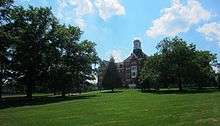
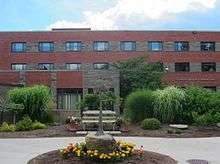
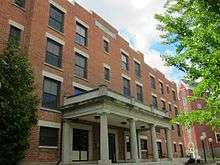
- Saunders Hall – single sex hall available to all Keuka women.
- Davis Hall - freshmen, co-ed hall.
- Harrington Hall – available to upper class students and transfers. This residence hall, built in 1924, places emphasis on leadership and cooperative living. The rooms are suite-style and there is an additional $250 charge per year.
- Ball Hall – the original building on campus in 1890 and renovated in 2005, it is available only to upper class and transfer students. Rooms are available in quads, triples, doubles, and singles with an additional $325 charge per year. The main floors and basement of Ball Hall also serve administrative functions.
- Blyley Hall – co-ed, upper classman and transfer hall.
- Space Hall - co-ed hall available to freshman boys and upper classman men and women.
- Strong Apartments - co-ed living for juniors and seniors.
- Keuka Park Apartments - co-ed living for graduate students and international students.
Exceptions to living on campus
- 23 years or older
- Married
- Dependent(s) under 18 years of age living with him/her
- Internship/practicum which requires site residency and/or is more than 30 miles from the Keuka College campus
- Medical or mental hardship
- Other compelling circumstances
Memberships and accreditations
- Middle States Association of Colleges and Secondary Schools
- Council on Social Work Education
- Commission on Collegiate Nursing Education
- Accreditation Council for Occupational Therapy Education of the American Occupational Therapy Association
- International Assembly of Collegiate Business Education
- Keuka College is a member of the Rochester Area Colleges consortium
References
- ↑ Education Colleges: Keuka College U.S. News & World Report. N.p., 2011. Web. 2 Dec 2011.
- ↑ Carnegie Foundation for the Advancement of Teaching. Web. 18 May 2013.
- ↑ About Keuka College. Web. 18 May 2013.
- ↑ Keuka College | Best Colleges | U.S. News & World Report. <http://colleges.usnews.rankingsandreviews.com/best-colleges/keuka-college-2744>. 18 May 2013.
- ↑ Office of Financial Aid, Keuka College. Web. 18 May 2013.
- ↑ About Keuka College. Web. 18 May 2013.
- ↑ Empowering Excellence: Strategic Plan 2013-2023. Web. 18 May 2013.
- ↑ Top 10 Lakeside Retreats. The Weather Channel. http://www.weather.com/activities/travel/vacationplanner/destination/top10/lakes.html?id=1&from=vac_top10. 18 May 2013.
- ↑ Fried, Joseph P.. "Job Requirement." The New York Times. N.p., January 6, 2008. Web. 4 Dec 2011. <http://www.nytimes.com/2008/01/06/education/edlife/required.html?pagewanted=all>
- ↑ About Keuka College. Web. 18 May 2013.
- ↑ Keuka China Programs. Web. 18 May 2013.
- ↑ Academic Affairs. Web. 18 May 2013.
- ↑ Academic Success at Keuka. Web. 18 May 2013.
- ↑ Accelerated Studies for Adults Program. Web. 18 May 2013.
- ↑ Center for Aquatic Research. Web. 18 May 2013.
- ↑ Center for Aquatic Research. Web. 18 May 2013.
- ↑ Center for Experiential Learning. Web. 18 May 2013.
- ↑ Fried, Joseph P.. "Job Requirement." The New York Times. N.p., January 6, 2008. Web. 4 Dec 2011. <http://www.nytimes.com/2008/01/06/education/edlife/required.html?pagewanted=all>
- ↑ Field Periods and Internships, Keuka College. Web. 18 May 2013. <http://experiential.keuka.edu/field-periods-internships>
- ↑ Center for Global Education. Web. 18 May 2013.
- ↑ Lightner Library. Web. 18 May 2013.
- ↑ Art Galleries, Lightner Library, Keuka College. Web. 18 May 2013.
- ↑ Office of the Registrar. Web. 18 May 2013.
- ↑ Accelerated Studies for Adults Program Locations. Keuka College. Web. 18 May 2013. <http://asap.keuka.edu/locations/>.
- ↑ "Accelerated Studies for Adults Program." Keuka College. N.p., 2011. Web. 4 Dec 2011. <http://academics.keuka.edu/asap>.
- ↑ "History of Keuka College." Keuka College. N.p., 2011. Web. 4 Dec 2011. <http://keuka.edu/history-of-keuka-college>
- ↑ Peter Eisenstadt and Laura-Eve Moss, eds., The Encyclopedia of New York State (Syracuse, NY: Syracuse University Press, 2005), p.835.
- ↑ "Keuka College Dedicated." The New York Times. 15 August 1890.<http://query.nytimes.com/mem/archive-free/pdf?res=F60916F7385F10738DDDAC0994D0405B8085F0D3>
- ↑ Philip A. Africa, Keuka College: A History (Valley Forge, PA: Judson Press, 1974), pp.99-113.
- ↑ Anthony O. Edmonds and E. Bruce Geelhoed, Ball State University: An Interpretive History (Bloomington, IN: Indiana University Press, 2001), p.47.
- ↑ "Our History," Ball Corporation official website. http://www.ball.com/history/ May 2013
- ↑ Philip A. Africa, Keuka College: A History (Valley Forge, PA: Judson Press, 1974), pp.114-115.
- ↑ Anthony O. Edmonds and E. Bruce Geelhoed, Ball State University: An Interpretive History (Bloomington, IN: Indiana University Press, 2001), p.51
- ↑ Charles R. Mitchell, Penn Yan and Keuka Lake: Images of America (Charleston, SC: Arcadia Publishing, 1997, reissued 2004), p.84.
- ↑ "The Leading Edge," American Institute for Architects-Central New York (AIACNY). June 2009.<http://www.aiacny.org/2009/June/aiacny6.htm>
- ↑ Empowering Excellence: Strategic Plan 2013-2023. Web. 19 May 2013.
- ↑ Empowering Excellence: Strategic Plan 2013-2023. Web. 18 May 2013.
- ↑ Donald Asher, Cool Colleges: For the Hyper-Intelligent, Self-Directed, Late Blooming, and Just Plain Different, 2nd ed. (New York: Ten Speed Press, 2007), p.169.
- ↑ http://www.democratandchronicle.com/story/news/2016/02/06/lawsuit-threat-forces-keuka-college-drop-wolfpack/79921518/